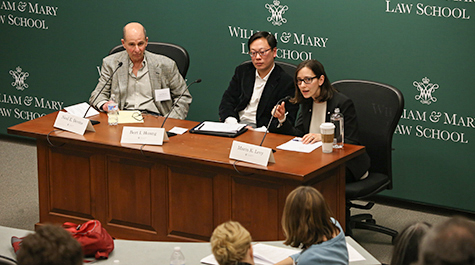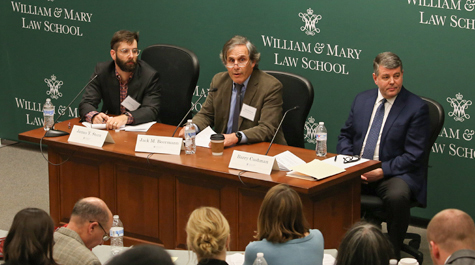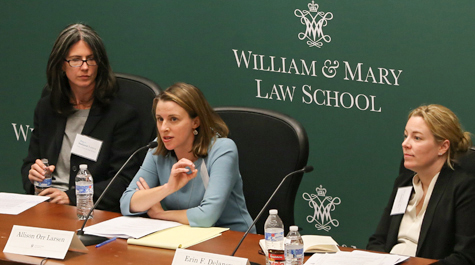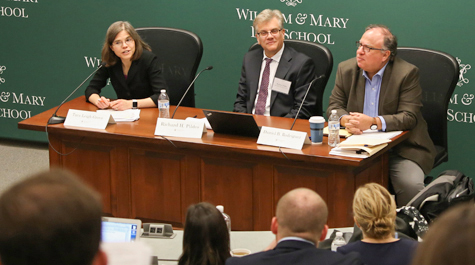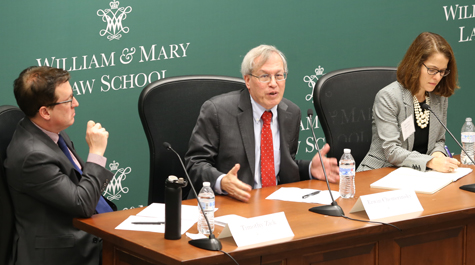Annual Law Review Symposium Examines Courts and Politics
On February 22 and 23, William & Mary Law Review hosted a symposium on “The Role of Courts in Politically Charged Moments,” where guest speakers presented paper topics that will be featured in Volume 61 of the William & Mary Law Review.
The symposium began on Friday afternoon with opening remarks from Professor Allison Orr Larsen, who invited the speakers for the event. Then Professor Neal Devins moderated the event’s first panel, “Courts Under Attack.” Through presentations of their theses and dialogue with the students and faculty in the audience, panelists explained the changing attitude of the public and elected officials toward the courts.
Professor Bert Huang, the Vice Dean for Intellectual Life and Professor of Law at Columbia Law School, presented his research into public perception of courts through opinion surveys. Next, Duke Law Professor Marin K. Levy spoke about what happens when courts themselves are the subject of legislation intending to curb their power in a politically contentious environment.
Professor James Stern then moderated a panel on “Historical Perspective on Judges in Politically Charged Times.” Boston University Law Professor Jack Beermann spoke about political crises throughout American history, with the premise that every era of American legal history has featured some degree of moral or political crisis, from slavery to segregation and the oppression of Native Americans. Barry Cushman, Professor of History and Political Science and Professor of Law at the University of Notre Dame, spoke about the judicial reforms of 1937 and the responses of federal courts to New Deal legislation.
Duke University Law Professor Margaret Lemos moderated the next panel, “American and British Courts in Politically Heated Moments.” Northwestern University Law Professor Erin Delaney discussed the legislative history of Brexit, specifically the Miller case, and the role of the United Kingdom’s recently instituted constitutional court in moderating the political and legal fallout of the Brexit referendum. Professor Allison Orr Larsen spoke about her paper on doctrinal differences between American and British legal opinions and the relative importance the two traditions place on factual versus legal justification.
The symposium continued Saturday morning when Professor Tara Leigh Grove moderated a panel on “Judicial Evaluation of a New Kind of President: The Role of Realism and Norms.” Daniel Rodriguez, Professor at Northwestern University Pritzker School of Law, spoke about the role of “soft law” administrative regulation as a check on the executive branch. Then New York University Law Professor Richard Pildes spoke about institutional realism in the courts, and the need for judicial opinions to reflect the changing nature of government institutions.
The final panel of the symposium was on “Courts as Protectors of Individual Rights,” and was moderated by Professor Timothy Zick. Erwin Chemerinsky, the Dean of Berkeley Law School, spoke about the importance of the Supreme Court taking politically contentious cases and not shying away from potentially divisive rulings. Mary-Rose Papandrea, Professor and Associate Dean for Academic Affairs at the University of North Carolina School of Law, spoke about the role of a free press in moments of political crisis and explored the legacy of New York Times v. Sullivan in protecting journalistic freedoms from legal attacks.
Throughout the symposium, the panelists received feedback on their topics from other guest speakers and faculty in attendance, who raised their own questions about the papers and suggested topics for further consideration. They also responded to questions from members of William & Mary Law Review and other students in attendance.
“There’s much more sensitivity to the issue of courts potentially being partisan and what that means for how to interpret their decisions, the authority of their decisions, the findings they make,” said Professor Devins. “And it’s not just the federal courts, but also the state courts are under attack. This is happening now more than ever before.”
About William & Mary Law School
Thomas Jefferson founded William & Mary Law School in 1779 to train leaders for the new nation. Now in its third century, America's oldest law school continues its historic mission of educating citizen lawyers who are prepared both to lead and to serve.
